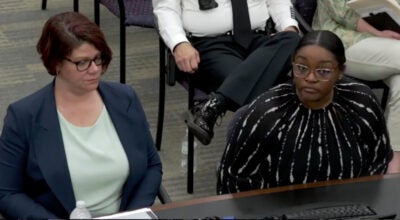Dalton is aggressor in opening NC governor debate
Published 12:00 am Thursday, October 4, 2012
RESEARCH TRIANGLE PARK (AP) — The campaign for North Carolina governor revved up Wednesday night as Democrat Walter Dalton went on the offensive against Republican Pat McCrory in their first televised debate this fall by seeking to bring him down a notch on issues of taxes and race.
Dalton, the lieutenant governor, went after McCrory in the first few minutes of the hourlong debate by accusing him of wanting to raise taxes on the middle class to the benefit of the wealthy and corporations. The former Charlotte mayor said the only one who had proposed raising taxes was Dalton a few months earlier by wanting to raise the sales tax by three-quarter of a penny to restore public education cuts. Dalton said later he’s not proposing new taxes now.
Dalton got McCrory riled up later by accusing McCrory of being insensitive to black voters for running a commercial featuring an eastern North Carolina sheriff who made what some black leaders call insensitive remarks after an election defeat. Dalton tried to link the ad to Republican Mitt Romney’s comment that nearly half of Americans believe they are victims and are entitled to government support.
“We need someone that not only brings Democrats and Republicans together, we need someone that brings everyone together,” Dalton said at the University of North Carolina Television studios in Research Triangle Park. “I’m not about representing 53 percent or 47 percent. I’m going to represent 100 percent.”
McCrory, the 2008 gubernatorial nominee, said he took offense from a video rolled out by Dalton’s campaign last week in which a black activist said McCrory “just doesn’t understand the African-American experience in North Carolina.”
The video is “not something that is going to bring people together,” McCrory said. “I have a history as a mayor and as a human being of mentoring young kids of all races and learning about their experiences. Listen, I treat people as individuals, not as groups, monolithic groups.”
Dalton responded: “If he finds this offensive it’s because he has offended.” McCrory offered a quick laugh of disbelief. Dalton added: “You can laugh at me if you want to. You do not understand how offensive the ad was.”
The two also disagreed on the sensitive issue of requiring voters to show photo identification at the polls. While surveys show the idea is supported by a majority of North Carolina residents, opponents say it’s a solution in search of a problem because there’s little voter fraud and it would make it harder for poor people and older adults to vote.
McCrory said the state and private business already require photo ID to perform many tasks, including buying some types of cold medicine.
“If we require an ID to get Sudafed … then I think an ID is good enough for the voting box in North Carolina,” McCrory said.
Dalton fired back: “Sudafed is not a precious constitutional right.”
The debate appeared to be a key moment for Dalton, whose campaign has trailed McCrory’s in fundraising. He’s been looking to raise uncertainty about the former seven-term mayor while linking him to Republicans in charge of the Legislature for the past two years on education cuts.
McCrory has been a quasi-incumbent in the race after narrowly losing to Beverly Perdue in the 2008 race and now seeking to end a 20-year stretch of Democratic governors in North Carolina. McCrory stuck to his theme of giving the state fresh leadership and attempting to link Dalton to Perdue, who decided not to seek a second term.
“I’m running for governor to fix our broken economy and to fix our broken government,” he said. For example, he told viewers Perdue said four years ago she would fix the state’s mental health system, but it didn’t happen.
Dalton, a former state senator from Rutherfordton and lieutenant governor since 2009, took a populist bent during the debate, saying he would protect average people in North Carolina if elected.
“I will fight for the middle class,” he told viewers during his closing statement. “I will fight for our working families. I will fight for our senior citizens that are on fixed incomes.”
Dalton tried to raise more suspicions of McCrory about his work at a Charlotte law firm and because he’s failed to release his tax returns.
“The people have my tax returns, and I think this is like an application for a job,” Dalton said, estimating he pays an estimated tax rate of 25 percent. “I’ve filled out my application and he hasn’t.”
McCrory didn’t give a percentage but said he’s “paid what was required by the IRS and the IRS has never questioned my tax returns during the 36 years that I’ve been gainfully employed in North Carolina.”
The debate, sponsored by the North Carolina Association of Broadcasters Educational Foundation, aired on the UNC-TV statewide network and many commercial broadcast stations. The foundation planned another debate Oct. 16 at UNC-TV. The final debate is slated for Oct. 24 at North Carolina Wesleyan College in Rocky Mount, sponsored in part by WRAL-TV.
Libertarian Barbara Howe hasn’t been invited to participate in any of the debates. The broadcasters’ foundation says it’s historically used a 10 percent polling threshold when inviting candidates. But Howe and her allies have said she’s a candidate in a party legally recognized by the state and should be able to express her views in such a venue.



